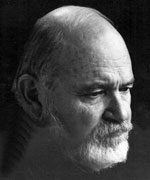Distinguished Faculty AwardRICHARD HEATON P'86

RICHARD HEATON P'86
Professor of Religious Studies
1961-1994
October 17, 2003
Richard L. Heaton was born in Geneva, Illinois. He began his lifelong devotion to religion, ethics, and education at the University of Michigan receiving his B.A. in 1945 and then a Bachelor of Divinity from the Yale Divinity School in 1948. Heaton earned a M.A. from Columbia University and the Union Theological Seminary in 1956, and later attended the University of Edinburgh, receiving his Ph.D. in 1961. Throughout these 20 some years of personal edification, Heaton was active in the U.S. Navy in an ROTC program training to be a chaplain. He served as a minister to the First Church of Christ in Bethany, Conn., and as a ministerial consultant for the Planned Parenthood Federation in New York City. He was director of the Student Christian Association and an instructor of religion at Vanderbilt University. Heaton was involved nationally as the executive secretary of the Inter-seminary Movement and director of the Inter-seminary Committee, and internationally with the World’s Student Christian Federation in the 1950’s. For two years while finishing his doctoral dissertation, Heaton had regular pastoral and preaching responsibilities at Aberdour and Dalgety Parish Curches in Fife, Scotland, while giving occasional lectures at the University of Edinburgh.
Heaton was described as a man of great patience, wisdom, and humanity. His former students remember his challenging and encouraging nature and his high standards that pushed students to think critically, dynamically, and for themselves. To all of his students, Heaton was a professor, friend and mentor who made the intellectual transition from adolescence to adulthood more comfortable. He saw wisdom in all individuals and instilled in them the feeling of importance.
Heaton married Elizabeth Reinhardt of Wheaton, Illinois and had five children -- Christopher, Murray, Frances, Becky, and Bethany ’86.
It was in 1961 that Professor Heaton came to Hobart and William Smith to begin his professorial career in religious studies and teach and co-direct the well-known “Western Civilization” course.
Heaton was an active member of many academic committees while at the Colleges, including the Middle States Evaluation, which initiated the 3-3-3 course load and trimester system. He was the first advisor of Farm Club and Farm House. During the ‘70s and ‘80s, “Doc” Heaton was chair of the religious studies department, and was an adjunct professor at the University of Calcutta during his sabbatical in Serampore, India, in 1981. Heaton organized and directed the first Geneva, Switzerland, term abroad program in 1985 and published multiple book reviews and manuscripts.
Outside the Colleges, Heaton was well known for his dedication to the Geneva community as he served on the Board of Education and was the president of the Geneva Homes Improvement Corporation, a local citizens group incorporated to improve and acquire housing for low income families. Later, Heaton was instrumental in the organization and establishment of a certified hospice in Ontario and Yates counties. For his vision, leadership, and devotion to this program and the organization of a large body of volunteers, Richard Heaton was awarded the Margaret Bonney Homecare Award in 1994.
It was this same devotion and humanity that Professor Heaton conveyed to his students, colleagues, and friends. His philosophy on life was circular-- “to whom much is given, from them much is expected.” His students weren’t the only ones actively seeking knowledge and understanding of the world around them as Professor Heaton believed that student-teacher relationships should be reciprocal--as described by retired Professor Marvin Bram-- “one complete person respecting, accepting from and giving to, another complete person.” Heaton had a reputation for “opening eyes” and “challenging the status quo” -- causing students to break free from the values, reasoning, and beliefs they brought to college, and developing a more global perspective. “Doc Heaton possessed a unique quality: being able to shake up the foundations of the way students think about the world in which they live. He took seriously the life of the mind and made young people want to do so as well.”
Heaton’s unorthodox teaching style and experimental assignments intrigued and engaged his students. He had the ability to reach out to all of his students, inspiring them to think independently and to question assumptions. Paul Colarulli ’72, trustee and former students of Professor Heaton said, Heaton “had a substantial effect on my life because he taught us that religion is not a stagnant concept but a force for social change.”
Advisor, mentor, friend, colleague, professor, reverend, father and husband are some of the words to describe how Heaton influenced the people around him, but above all, he lived as an example of everything he taught.
